- 20 Inspiration Quotes for Self-Improvement and Resilience
- 20 Motivational Quotes on Thought and Thinking
- You Have the Power Over Your Mind....
- The World As We Have Created It.....
- There is nothing either good or bad....
- Circumstance do not change the man...
- Thinking is the hardest thing....
20 Inspirational Quotes for Self-Improvement and Resilience
Self-improvement and resilience are vital for navigating life’s challenges and achieving personal growth. Words of wisdom can serve as powerful reminders of your strength and potential, inspiring you to persevere and thrive. Here are 20 inspirational quotes to motivate your journey toward self-improvement and resilience.
---
**Quotes for Self-Improvement**
1. "Success is not the result of spontaneous combustion. You must set yourself on fire." – Arnold H. Glasow
2. "Don’t wish it were easier. Wish you were better." – Jim Rohn
3. "The secret of getting ahead is getting started." – Mark Twain
4. "You are never too old to set another goal or to dream a new dream." – C.S. Lewis
5. "What you do today can improve all your tomorrows." – Ralph Marston
6. "Small daily improvements are the key to staggering long-term results." – Robin Sharma
7. "Believe you can and you're halfway there." – Theodore Roosevelt
8. "Self-discipline is the bridge between goals and accomplishment." – Jim Rohn
9. "Personal growth is not a matter of learning new information but unlearning old limits." – Alan Cohen
10. "Your life does not get better by chance, it gets better by change." – Jim Rohn
---
**Quotes for Resilience**
11. "The oak fought the wind and was broken, the willow bent when it must and survived." – Robert Jordan
12. "Life doesn’t get easier or more forgiving; we get stronger and more resilient." – Steve Maraboli
13. "Rock bottom became the solid foundation on which I rebuilt my life." – J.K. Rowling
14. "Although the world is full of suffering, it is also full of the overcoming of it." – Helen Keller
15. "Fall seven times, stand up eight." – Japanese Proverb
16. "Courage doesn’t always roar. Sometimes courage is the quiet voice at the end of the day saying, 'I will try again tomorrow.'" – Mary Anne Radmacher
17. "Resilience is knowing that you are the only one that has the power and the responsibility to pick yourself up." – Mary Holloway
18. "Do not judge me by my success, judge me by how many times I fell down and got back up again." – Nelson Mandela
19. "A river cuts through rock not because of its power but because of its persistence." – James N. Watkins
20. "Hardships often prepare ordinary people for an extraordinary destiny." – C.S. Lewis
---
**How to Use These Quotes**
1. **Daily Reminders**: Write a quote that resonates with you on a sticky note or in your planner to reflect on throughout the day.
2. **Journaling Prompts**: Use these quotes as inspiration for journal entries about your personal growth and resilience.
3. **Affirmation Support**: Pair these quotes with daily affirmations to reinforce your mindset for success and perseverance.
4. **Inspiration Boards**: Add these quotes to a vision board or digital wallpaper to keep them in sight.
---
Conclusion
Inspirational quotes are not just words; they are tools to reignite your determination, strengthen your resolve, and remind you of your boundless potential. Let these quotes inspire you to embrace self-improvement and resilience as daily practices, empowering you to overcome challenges and thrive in every aspect of life.
20 Motivational Quotes on Thought and Thinking
Thoughts have the power to shape our reality, influence our actions, and determine our success. Here are 20 motivational quotes that inspire deeper thinking and a positive mindset to help you unlock your potential.
---
**Quotes About the Power of Thought**
1. "What you think, you become. What you feel, you attract. What you imagine, you create." – Buddha
2. "Change your thoughts and you change your world." – Norman Vincent Peale
3. "The mind is everything. What you think you become." – Marcus Aurelius
4. "Your life is a reflection of your thoughts. If you change your thinking, you can change your life." – Brian Tracy
5. "You have power over your mind—not outside events. Realize this, and you will find strength." – Marcus Aurelius
---
**Quotes About Positive Thinking**
6. "A positive mind finds a way it can be done; a negative mind looks for all the ways it can’t be done." – Napoleon Hill
7. "Optimism is the faith that leads to achievement. Nothing can be done without hope and confidence." – Helen Keller
8. "Positive thinking will let you do everything better than negative thinking will." – Zig Ziglar
9. "Keep your face always toward the sunshine, and shadows will fall behind you." – Walt Whitman
10. "Your mind is a powerful thing. When you fill it with positive thoughts, your life will start to change." – Unknown
---
**Quotes About Deep Thinking and Reflection**
11. "The unexamined life is not worth living." – Socrates
12. "Five percent of the people think; ten percent of the people think they think; and the other eighty-five percent would rather die than think." – Thomas A. Edison
13. "Thinking is the hardest work there is, which is probably the reason why so few engage in it." – Henry Ford
14. "The world as we have created it is a process of our thinking. It cannot be changed without changing our thinking." – Albert Einstein
15. "Spend eighty percent of your time focusing on the opportunities of tomorrow rather than the problems of yesterday." – Brian Tracy
---
**Quotes About Creative and Expansive Thinking**
16. "Creativity is intelligence having fun." – Albert Einstein
17. "The mind is not a vessel to be filled but a fire to be kindled." – Plutarch
18. "You can’t use up creativity. The more you use, the more you have." – Maya Angelou
19. "Great things are not done by impulse but by a series of small things brought together." – Vincent Van Gogh
20. "Think big and don’t listen to people who tell you it can’t be done. Life’s too short to think small." – Tim Ferriss
---
**How to Use These Quotes**
- Write one quote in your journal each morning to inspire your day.
- Create a vision board featuring quotes that resonate with your goals.
- Reflect on a quote and how it applies to your current situation during moments of self-reflection.
- Share these quotes with others to spark meaningful conversations about thought and growth.
---
Conclusion
Thoughts are the architects of our destiny. By nurturing positive, expansive, and reflective thinking, you can unlock creativity, resilience, and success in all areas of your life. Let these quotes inspire you to harness the power of your mind and take meaningful steps toward a brighter future.
**Reflection on the Marcus Aurelius Quote:**
 "You have power over your mind - not outside events. Realize this, and you will find strength." – Marcus Aurelius
"You have power over your mind - not outside events. Realize this, and you will find strength." – Marcus Aurelius
This timeless wisdom from the Stoic philosopher Marcus Aurelius holds profound significance in today’s chaotic world. It serves as a reminder that while external circumstances may be unpredictable and beyond our control, the one thing we can always govern is our mindset.
---
**The Power of the Mind**
The mind is the epicenter of our experiences. How we perceive and respond to life’s challenges often dictates the quality of our lives. While we may not influence external events, we can choose how we think about them, interpret them, and ultimately respond. Mastery over the mind creates a sense of stability and strength, even in turbulent times.
---
**Control vs. Influence**
This quote underscores a critical distinction:
- **Control**: We have complete control over our thoughts, attitudes, and actions.
- **Influence**: We may influence outside events or others, but we cannot guarantee outcomes.
Realizing this difference liberates us from unnecessary frustration and empowers us to focus on what we can control—our inner world.
---
**Finding Strength in Acceptance**
True strength comes from accepting that external events are beyond our power while focusing on mastering our responses. For example:
- A challenging situation may arise, but your choice to stay calm, patient, and proactive determines how it affects you.
- A setback in your career may seem disheartening, but viewing it as an opportunity for growth can transform the experience.
This acceptance is not passive resignation; rather, it’s an active choice to direct your energy wisely.
---
**Practical Applications**
1. **Mindfulness**: Practice being present in the moment. Recognize your thoughts and redirect negative patterns.
2. **Journaling**: Reflect on situations where you can separate your reactions from external events.
3. **Gratitude**: Focus on what you have control over, such as the effort you put into your goals or the love you share with others.
---
**Conclusion**
Marcus Aurelius’ words inspire us to embrace the inner strength that comes from self-mastery. Life will always present challenges, but the ability to respond with clarity, purpose, and resilience lies within. By choosing to focus on what we can control—our minds—we unlock a boundless source of power and peace.
**Reflection on the Albert Einstein Quote**
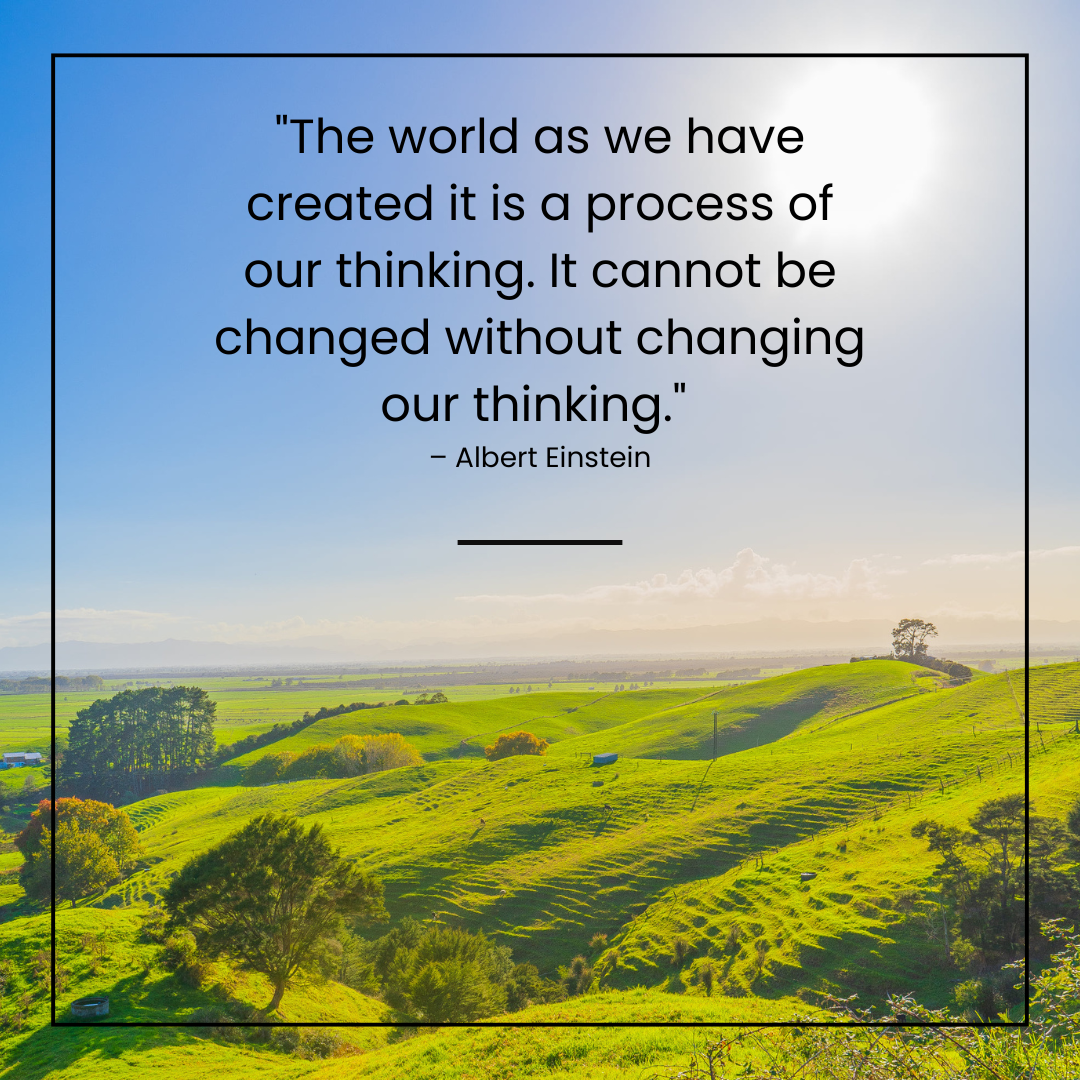 "The world as we have created it is a process of our thinking. It cannot be changed without changing our thinking." – Albert Einstein
"The world as we have created it is a process of our thinking. It cannot be changed without changing our thinking." – Albert Einstein
This profound insight from Albert Einstein reminds us of the deep connection between thought and reality. Our world—be it personal, social, or global—is a reflection of the collective and individual thoughts that shape it. To bring about meaningful change, we must first address the source of all action: our thinking.
---
**The Power of Thought**
Every invention, philosophy, and system that defines our world originated as a thought. Our beliefs and mental frameworks guide our decisions and behaviors, influencing not only our lives but also the environments we create.
- A thriving community begins with inclusive thinking.
- A sustainable planet depends on conscious, forward-thinking mindsets.
Einstein’s quote highlights that our thinking is both the problem and the solution. Change must start within.
---
**Why Change Requires a Shift in Thinking**
If the results of our actions stem from our thought processes, then repeating the same patterns of thinking will inevitably yield the same outcomes. This is why significant transformation—whether personal or societal—requires a shift in perspective:
- **Breaking Limiting Beliefs**: To grow, we must challenge the mental barriers that hold us back.
- **Adopting New Paradigms**: Progress demands thinking that aligns with future possibilities rather than past limitations.
- **Cultivating Creativity**: Fresh ideas lead to innovative solutions, and this requires letting go of rigid or outdated thought patterns.
---
**How to Change Thinking**
1. **Practice Self-Awareness**
Recognize habitual thoughts and assess whether they serve you or hinder you.
2. **Seek Diverse Perspectives**
Engage with people, ideas, and cultures different from your own to broaden your worldview.
3. **Embrace Continuous Learning**
Stay curious and open to new knowledge that challenges existing beliefs.
4. **Mindset Shifts**
Transition from a fixed mindset to a growth mindset, focusing on learning and adaptability.
---
**Applications in Personal and Global Contexts**
- **Personal Growth**: If you feel stuck, examine the thoughts that reinforce your current state. Shifting your mindset can unlock new possibilities.
- **Social Change**: Movements for equality, sustainability, and justice often begin with a collective shift in how society thinks about issues.
- **Innovation**: Progress in science, technology, and art thrives on creative thinking that dares to challenge the status quo.
---
**Conclusion**
Einstein’s quote is both a challenge and an opportunity. It asks us to look inward, recognizing that the change we seek externally begins with a transformation of thought. By shifting our mental frameworks, we can reshape the world we live in—making it more innovative, equitable, and aligned with our highest aspirations.
**Reflection on William Shakespeare’s Quote**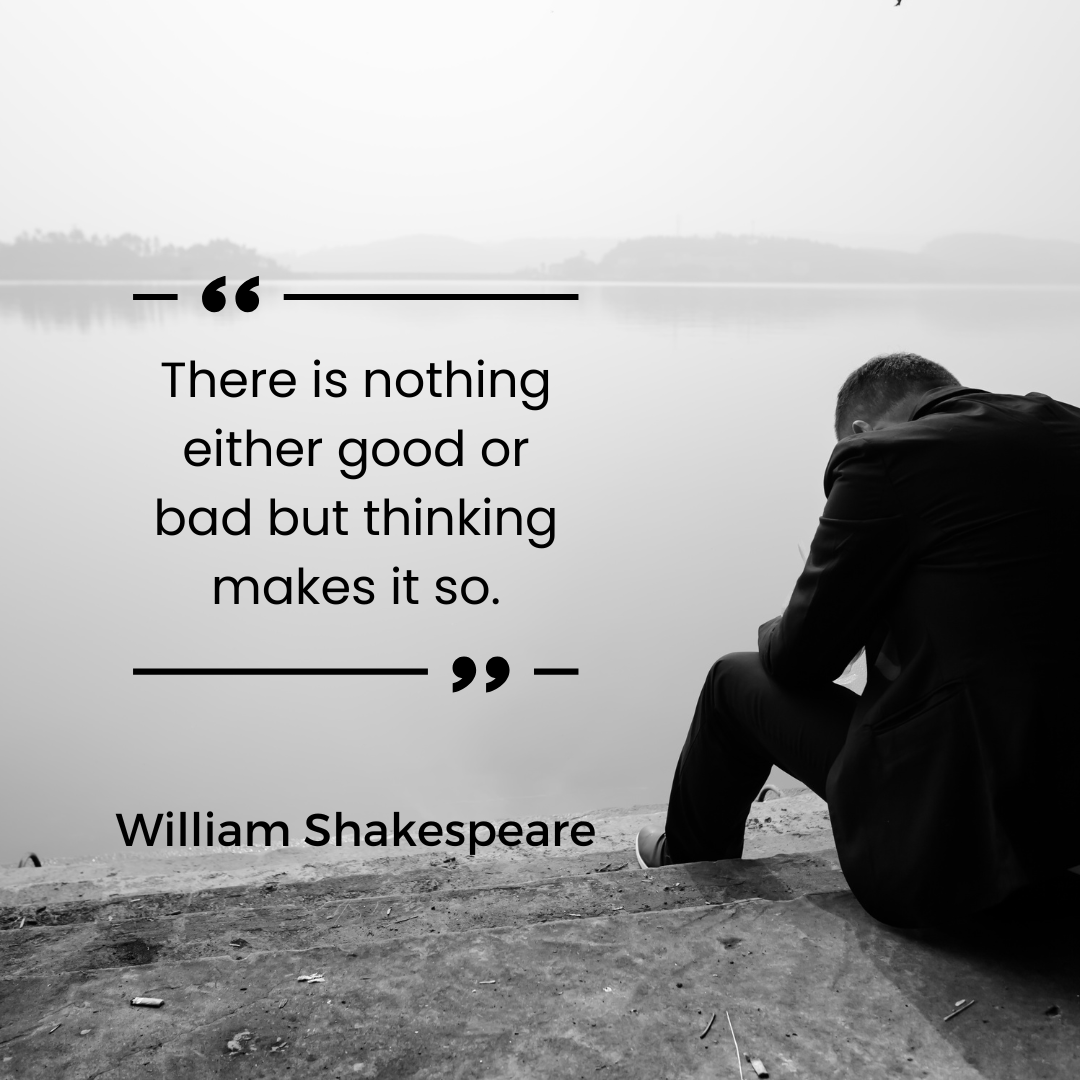
"There is nothing either good or bad but thinking makes it so." – William Shakespeare
This profound quote from *Hamlet* highlights a universal truth about human perception: the way we think about events, experiences, and situations determines how we perceive them. Shakespeare invites us to explore the power of our minds in shaping our reality.
---
**The Subjectivity of Good and Bad**
What one person considers good, another may view as bad, depending on their beliefs, experiences, and values. This subjectivity underscores that it’s not the event itself that defines its nature, but our interpretation of it.
**Example**:
- Rain on a wedding day may seem bad to the couple, but good to a farmer experiencing a drought.
The same event can hold completely different meanings based on perspective.
---
**The Role of Thinking in Our Experiences**
Our thoughts act as filters through which we experience the world. They shape:
- **Emotions**: How we feel about a situation stems from our interpretation of it.
- **Reactions**: The way we respond depends on whether we view an event positively or negatively.
- **Outcomes**: The actions we take are often influenced by how we think about the possibilities.
By changing how we think, we can alter our emotional responses and behaviors, ultimately transforming our experiences.
---
**Lessons from the Quote**
1. **Empowerment Through Perspective**
When we understand that our thoughts create meaning, we gain the ability to shift our perspective. This empowers us to find positivity in challenges and gratitude in ordinary moments.
2. **Detachment from Judgments**
By stepping back and observing our thoughts, we can detach from labels like "good" or "bad" and see situations as neutral experiences with opportunities for growth.
3. **Cultivating Mindfulness**
Mindfulness allows us to observe our thoughts without judgment, helping us reshape negative patterns and foster resilience.
---
**Practical Applications**
1. **Reframe Challenges**
When faced with adversity, ask yourself, "How can this situation help me grow?"
2. **Practice Gratitude**
Focus on the aspects of life that bring you joy and meaning, even during difficult times.
3. **Pause Before Reacting**
When labeling something as "bad," take a moment to consider alternative perspectives.
---
**Conclusion**
Shakespeare’s words remind us that our thoughts are powerful tools that shape our perception of the world. By becoming aware of how we interpret events, we can break free from limiting beliefs and cultivate a mindset that embraces life’s complexities with curiosity and understanding. Truly, thinking holds the key to making our reality what we want it to be.
**Reflection on James Allen’s Quote**
"Circumstances do not make the man; they reveal him." – James Allen  This insightful quote from James Allen emphasizes the idea that external circumstances are not the defining force of one’s character but rather a mirror that reveals inner qualities. It challenges us to look within and consider how we respond to life’s challenges, triumphs, and uncertainties.
This insightful quote from James Allen emphasizes the idea that external circumstances are not the defining force of one’s character but rather a mirror that reveals inner qualities. It challenges us to look within and consider how we respond to life’s challenges, triumphs, and uncertainties.
---
**Circumstances as a Mirror**
Life’s situations—whether favorable or challenging—serve as opportunities to showcase our inner values, strength, and resilience. They do not shape who we are but instead reveal:
- **Our true priorities**: What we value most becomes clear when we face difficult decisions.
- **Our character**: How we respond under pressure demonstrates our patience, courage, and integrity.
- **Our mindset**: Whether we approach obstacles with a fixed or growth mindset becomes evident during trials.
**Example**: Two individuals facing the same setback, such as losing a job, may respond differently—one may become bitter and resigned, while the other may view it as an opportunity for growth. The difference lies not in the circumstance but in the individual.
---
**Why Circumstances Don’t Define Us**
- **External vs. Internal Control**: While circumstances are external, our reactions are within our control. Choosing how to respond allows us to transcend circumstances and maintain agency over our lives.
- **Temporary Nature of Situations**: Circumstances come and go, but the lessons we learn and the growth we experience are lasting.
---
**How to Respond When Circumstances Test You**
1. **Reflect Instead of React**
Use challenges as an opportunity to understand your inner strengths and areas for growth.
2. **Focus on Growth**
Ask yourself, "What can I learn from this situation?" or "How can I become stronger through this experience?"
3. **Stay True to Your Values**
Let your principles guide your actions, even when circumstances seem overwhelming.
4. **Practice Resilience**
Develop the ability to adapt and bounce back, knowing that your response matters more than the event itself.
---
**Revealing Your True Self**
James Allen’s quote invites us to view life’s circumstances not as forces that shape our identity, but as catalysts for self-awareness. Whether it’s success or failure, calm or chaos, every moment holds the potential to uncover our true character.
---
**Conclusion**
Ultimately, circumstances are a test—not of what the world can do to us, but of what we bring to the world. By embracing this perspective, we can rise above external events and focus on cultivating the best version of ourselves. As we learn to respond with wisdom and strength, we reveal our inner potential and create a life of purpose and meaning.
**Reflection on Henry Ford’s Quote**
"Thinking is the hardest work there is, which is probably why so few engage in it." – Henry Ford 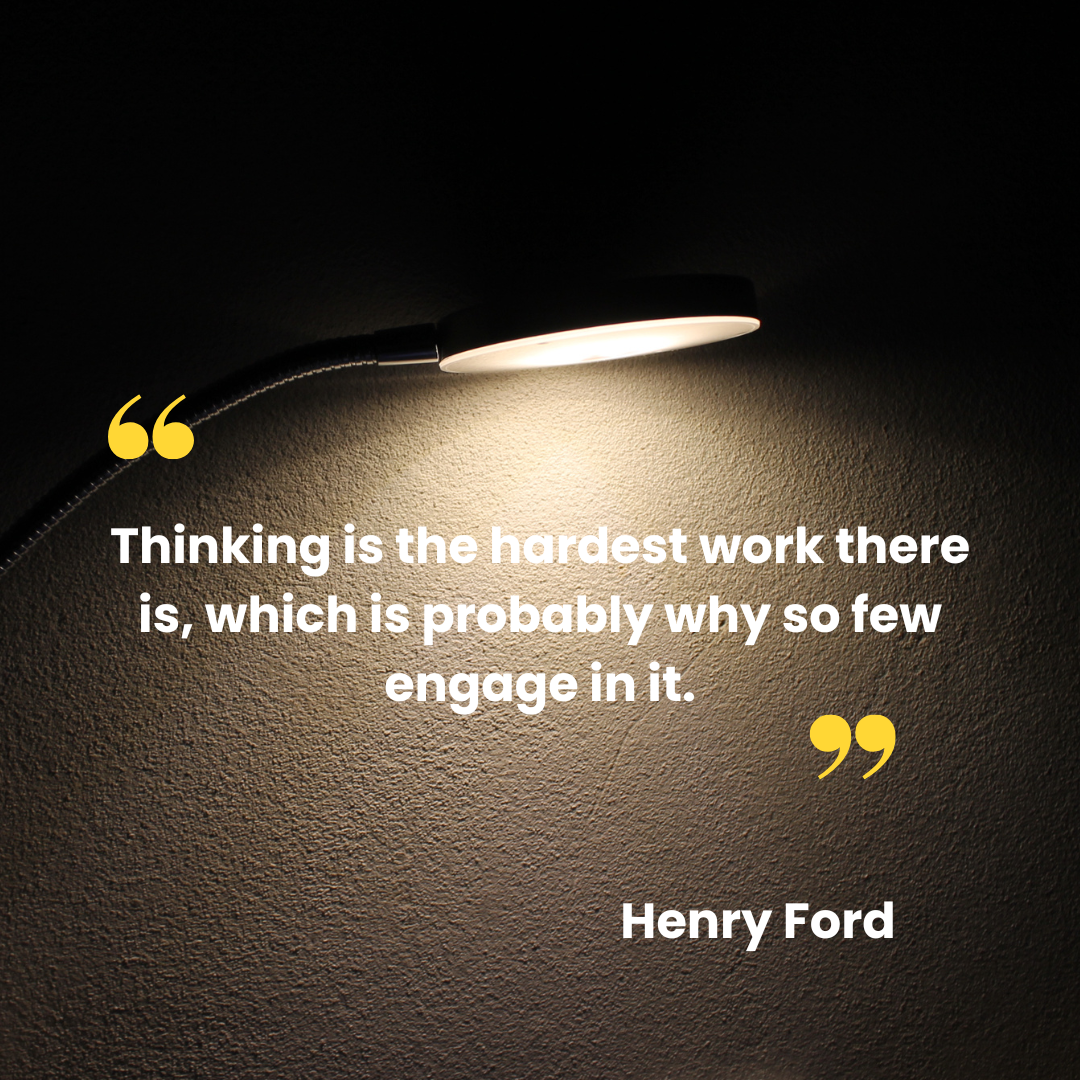 Henry Ford’s quote offers a sharp observation about the effort and discipline required for deep, intentional thinking. In a world often focused on quick fixes and surface-level actions, Ford emphasizes the value and rarity of sustained, thoughtful engagement.
Henry Ford’s quote offers a sharp observation about the effort and discipline required for deep, intentional thinking. In a world often focused on quick fixes and surface-level actions, Ford emphasizes the value and rarity of sustained, thoughtful engagement.
---
**Why Thinking Is Hard Work**
1. **Mental Effort and Focus**
Deep thinking requires concentration, mental discipline, and the ability to wrestle with complex ideas. Unlike reactive or routine thought, intentional thinking demands time, energy, and persistence.
2. **Facing Uncertainty**
Thinking deeply often means confronting uncertainty, questioning assumptions, and exploring unknowns—challenging tasks that can feel uncomfortable.
3. **Delayed Gratification**
Unlike quick decisions or reactive habits, thoughtful problem-solving doesn’t provide immediate results. It requires patience and a willingness to delay gratification.
---
**The Importance of Thinking**
Despite its difficulty, intentional thinking is the foundation of progress and innovation.
- **Problem-Solving**: Careful analysis of problems often leads to more effective, long-term solutions.
- **Innovation**: Groundbreaking ideas and advancements come from deep, creative thought.
- **Self-Awareness**: Reflective thinking fosters personal growth, emotional intelligence, and clarity in decision-making.
Ford’s own success as an innovator underscores the importance of applying thoughtful effort to create meaningful change.
---
**Why Few Engage in It**
1. **Distractions**: Modern life is filled with distractions that pull people away from sustained focus.
2. **Comfort Zones**: Superficial thinking feels easier and safer than grappling with challenging questions or complex problems.
3. **Misplaced Value**: Many prioritize busywork or immediate action over strategic thought, mistaking activity for productivity.
---
**How to Cultivate Intentional Thinking**
1. **Set Time Aside**
Dedicate uninterrupted time for thinking, free from distractions.
2. **Ask Questions**
Engage with problems by asking "why," "how," and "what if."
3. **Reflect Regularly**
Use journaling, meditation, or quiet contemplation to deepen your understanding of yourself and your challenges.
4. **Embrace Discomfort**
Accept that deep thinking may feel difficult but is ultimately rewarding.
---
**Conclusion**
Henry Ford’s quote reminds us that true thinking is not passive—it’s active, challenging, and transformative. By engaging in thoughtful work, we can solve problems, innovate, and grow in ways that reactive or shallow thinking cannot achieve. While it may be the hardest work, it is also the most meaningful and impactful. In a world that often values speed and surface-level answers, the rare art of deep thinking is a skill worth cultivating.
- Tab Home
- It is the mark of an educated mind...
- It takes one positive thought...
- The Greatest weapon against stress...
- A man is a product of his thoughts...
- More thoughts have been mind from...
**Reflection on Aristotle’s Quote**
"It is the mark of an educated mind to be able to entertain a thought without accepting it." – Aristotle  This timeless insight from Aristotle emphasizes the importance of intellectual curiosity and critical thinking. An educated mind doesn’t merely absorb ideas—it evaluates them with reason, understanding, and discernment.
This timeless insight from Aristotle emphasizes the importance of intellectual curiosity and critical thinking. An educated mind doesn’t merely absorb ideas—it evaluates them with reason, understanding, and discernment.
---
**Entertaining a Thought Without Accepting It**
To "entertain a thought" means to consider, explore, and examine an idea from multiple angles without automatically endorsing or rejecting it. This ability reflects intellectual maturity and openness.
- **Curiosity**: It shows a willingness to engage with new ideas, even those that challenge one’s beliefs.
- **Discernment**: It demonstrates the capacity to evaluate ideas critically, separating fact from opinion.
- **Flexibility**: It allows for growth by creating space to question assumptions and consider alternatives.
---
**Why This Skill Matters**
1. **Promotes Understanding**
Considering different perspectives fosters empathy and helps bridge divides, whether in personal relationships or global discourse.
2. **Encourages Growth**
By entertaining new ideas, we expand our horizons and refine our own beliefs. Exposure to diverse viewpoints leads to deeper insights and innovation.
3. **Guards Against Extremism**
The refusal to consider opposing ideas can lead to dogmatism and narrow-mindedness. A willingness to entertain other thoughts keeps us balanced and objective.
---
**How to Cultivate This Ability**
1. **Practice Active Listening**
Listen to others without interrupting or forming judgments. Focus on understanding their point of view.
2. **Ask Questions**
Challenge ideas by asking "Why?" or "What evidence supports this?" rather than outright rejecting them.
3. **Separate Emotions from Evaluation**
Avoid letting personal biases cloud your judgment. Assess ideas on their merits.
4. **Engage in Thought Experiments**
Imagine scenarios where you adopt a different perspective. This mental exercise sharpens your ability to entertain new ideas.
---
**Applications of the Quote**
- **Education**: A well-rounded education encourages students to explore diverse fields of thought without immediate acceptance or rejection.
- **Debate**: Productive dialogue relies on understanding opposing viewpoints, even if you don’t agree with them.
- **Personal Growth**: Embracing this principle helps you challenge your own biases and grow intellectually.
---
**Conclusion**
Aristotle’s quote reminds us that an educated mind is not rigid or dogmatic but open and discerning. The ability to entertain a thought without accepting it reflects confidence in one’s reasoning and a commitment to seeking truth. By practicing intellectual humility and curiosity, we enrich our understanding of the world and become more thoughtful, balanced individuals.
**Reflection on Robert H. Schuller’s Quote**
"It takes one positive thought, when given a chance to survive and thrive, to overpower an entire army of negative thoughts." – Robert H. Schuller
 This inspiring quote highlights the transformative power of positivity, even in the face of overwhelming negativity. Schuller reminds us that a single positive thought has the potential to ignite hope, build resilience, and shift our mindset toward growth and success.
This inspiring quote highlights the transformative power of positivity, even in the face of overwhelming negativity. Schuller reminds us that a single positive thought has the potential to ignite hope, build resilience, and shift our mindset toward growth and success.
---
**The Strength of Positivity**
Positive thinking is not just a fleeting emotion—it’s a mental shift that rewires how we perceive challenges and setbacks. A single positive thought, when nurtured, can:
- **Break Negative Cycles**: Replace self-doubt and fear with confidence and hope.
- **Inspire Action**: Motivate us to move forward, even in difficult circumstances.
- **Strengthen Resilience**: Equip us to withstand adversity by focusing on possibilities rather than obstacles.
---
**Why Positivity Can Overpower Negativity**
1. **Focus and Amplification**
Our minds tend to amplify whatever we focus on. Choosing to focus on positivity can dilute and diminish the influence of negative thoughts.
2. **Momentum of Optimism**
A positive thought encourages action, which leads to progress. Progress reinforces positivity, creating a cycle of growth and success.
3. **Emotional Resilience**
Positivity builds emotional strength, helping us respond to challenges with calmness and creativity rather than fear or despair.
---
**How to Give Positive Thoughts a Chance**
1. **Cultivate Gratitude**
Focus on the things you are grateful for. Gratitude helps shift the focus from what’s wrong to what’s right.
2. **Challenge Negative Thoughts**
When negativity arises, question its validity. Replace “I can’t” with “What if I try?”
3. **Feed Positivity**
Surround yourself with uplifting people, read inspirational content, and engage in activities that nurture optimism.
4. **Celebrate Small Wins**
Recognizing even minor achievements helps reinforce a positive mindset and builds momentum.
---
**Examples of Positivity’s Impact**
- **In Adversity**: A single thought like “I can learn from this” can turn a setback into a stepping stone.
- **In Daily Life**: Reframing “I have too much to do” as “I get to accomplish so much today” transforms stress into motivation.
---
**Conclusion**
Robert H. Schuller’s words remind us that positivity is a powerful force capable of outshining the darkest doubts. By nurturing even one positive thought and giving it the chance to grow, we can change the narrative of our lives. This simple yet profound practice has the potential to transform challenges into opportunities and pave the way for a brighter, more fulfilling future.
**Reflection on William James’ Quote**
"The greatest weapon against stress is our ability to choose one thought over another." – William James
 This insightful quote from William James highlights a profound truth: the power to manage stress lies within our own minds. By consciously selecting our thoughts, we can transform how we experience and respond to life’s challenges.
This insightful quote from William James highlights a profound truth: the power to manage stress lies within our own minds. By consciously selecting our thoughts, we can transform how we experience and respond to life’s challenges.
---
**Stress and the Role of Thoughts**
Stress is often less about the external situation and more about how we perceive it. Our thoughts shape our emotional responses and dictate whether we feel overwhelmed or empowered.
- **Negative Thoughts**: Amplify stress by focusing on fears, doubts, and worst-case scenarios.
- **Positive or Neutral Thoughts**: Diminish stress by fostering calm, perspective, and solutions.
The ability to choose our thoughts gives us control over how we interpret and handle stressful situations.
---
**Why Choosing Thoughts Reduces Stress**
1. **Reframing Perspective**
By consciously choosing thoughts like, “This is an opportunity to grow,” instead of, “This is impossible,” we shift our mindset from helplessness to empowerment.
2. **Interrupting Negative Loops**
Stress often comes from repetitive, unproductive thoughts. Replacing these with constructive ones helps break the cycle.
3. **Promoting Emotional Regulation**
Positive thoughts trigger calming emotions, reducing the physiological effects of stress, such as a racing heart or tense muscles.
---
**Practical Ways to Choose Better Thoughts**
1. **Practice Mindfulness**
Awareness of your thoughts is the first step. Pause, observe your thinking, and ask, “Is this thought helping or hurting me?”
2. **Use Affirmations**
Replace stress-inducing thoughts with affirmations like, “I am capable of handling this,” or, “I will focus on what I can control.”
3. **Reframe Challenges**
Instead of thinking, “This is too much,” try, “I can take this one step at a time.”
4. **Focus on Solutions**
Shift from dwelling on the problem to brainstorming actionable steps to resolve it.
---
**Examples of Thought Choice in Action**
- **During a Busy Day**: Replace “I’m too busy” with “I’m grateful to have meaningful tasks to complete.”
- **Facing a Challenge**: Replace “I’ll never succeed” with “I’ll learn as I go.”
---
**Conclusion**
William James’ wisdom reminds us that while we can’t always control external circumstances, we can control how we think about them. The ability to choose one thought over another is a powerful weapon, enabling us to reduce stress, build resilience, and navigate life’s challenges with clarity and strength. By practicing mindful thought selection, we can create a calmer, more intentional, and fulfilling life.
**Reflection on Mahatma Gandhi’s Quote**
"A man is but the product of his thoughts; what he thinks, he becomes." – Mahatma Gandhi
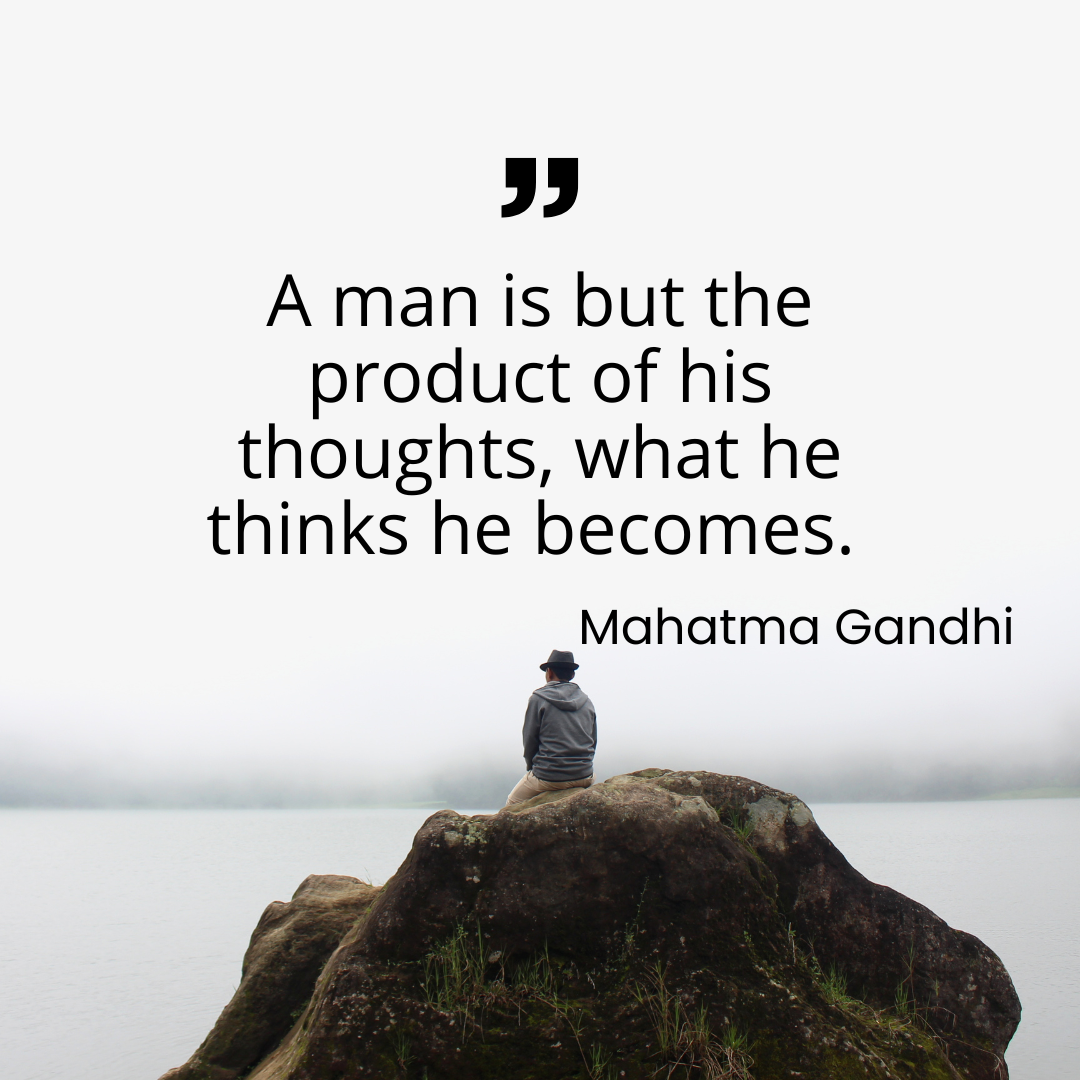 This powerful statement by Mahatma Gandhi underscores the transformative role of thoughts in shaping our lives. Our thoughts are not just fleeting mental activities; they are the foundation of our identity, actions, and ultimately, our destiny.
This powerful statement by Mahatma Gandhi underscores the transformative role of thoughts in shaping our lives. Our thoughts are not just fleeting mental activities; they are the foundation of our identity, actions, and ultimately, our destiny.
---
**The Power of Thoughts**
Our thoughts serve as the blueprint for the life we build. They influence:
- **Beliefs**: Repeated thoughts solidify into core beliefs that shape our self-perception and worldview.
- **Actions**: Thoughts guide our choices, behaviors, and habits. Positive, empowering thoughts inspire productive actions, while negative ones can lead to self-limiting behaviors.
- **Outcomes**: Over time, the alignment of our thoughts and actions creates the reality we experience.
---
**What It Means to Become What We Think**
1. **Self-Fulfilling Prophecies**
When we consistently think about success, growth, and possibilities, our actions align with those thoughts, increasing the likelihood of achieving our goals. Conversely, focusing on failure or inadequacy often perpetuates those outcomes.
2. **Energy and Focus**
Our thoughts direct where we invest our energy. For example, a person who thinks positively about their abilities will focus on opportunities rather than obstacles.
3. **Personal Growth**
By thinking intentionally about who we want to become, we can adopt habits, skills, and mindsets that support that vision.
---
**Cultivating Empowering Thoughts**
1. **Practice Positive Affirmations**
Reinforce empowering beliefs by regularly repeating affirmations like, “I am capable,” or, “I am growing every day.”
2. **Challenge Negative Thinking**
Recognize and question limiting thoughts. Replace “I can’t do this” with “I will find a way to do this.”
3. **Visualize Your Goals**
Spend time imagining yourself achieving your aspirations. Visualization helps align your thoughts and actions with your desired outcomes.
4. **Feed Your Mind with Positivity**
Surround yourself with uplifting influences, such as inspiring books, people, and experiences, to nurture positive thinking.
---
**Examples in Practice**
- **Personal Development**: If you think of yourself as a lifelong learner, you’ll naturally seek out opportunities to grow, leading to personal and professional advancement.
- **Overcoming Challenges**: Focusing on thoughts like, “I can adapt and persevere,” helps you navigate difficulties with resilience.
---
**Conclusion**
Mahatma Gandhi’s wisdom reminds us of the immense power of our thoughts. By consciously shaping our mental narrative, we have the ability to create a life that aligns with our aspirations. To think positively and intentionally is to take control of our destiny. Indeed, what we think, we truly become.
**Reflection on Napoleon Hill’s Quote**
"More gold has been mined from the thoughts of men than has ever been taken from the earth." – Napoleon Hill 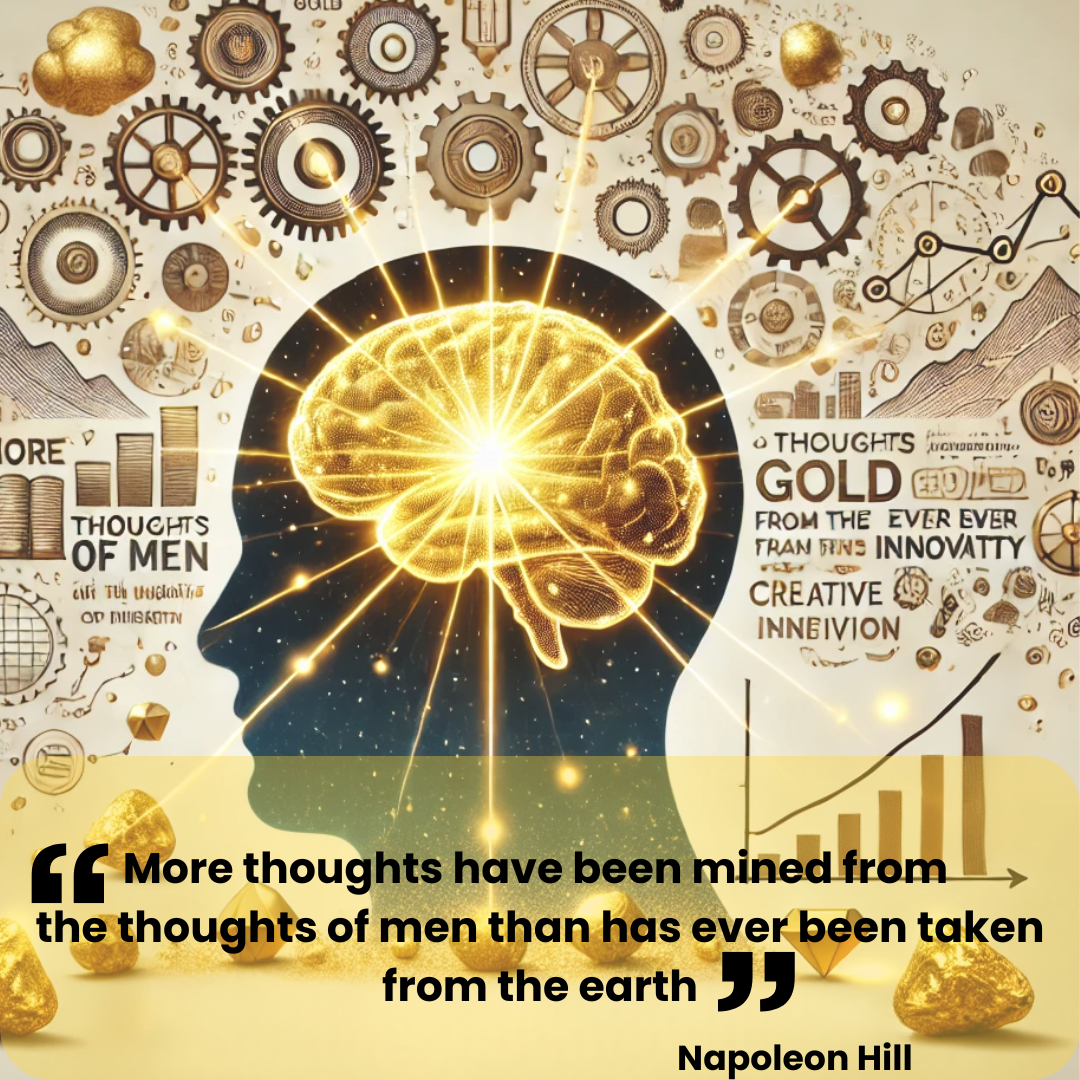 This powerful observation by Napoleon Hill highlights the boundless potential of human thought. Unlike the finite resources of the earth, the wealth generated by ideas, creativity, and innovation is limitless, continuously reshaping the world.
This powerful observation by Napoleon Hill highlights the boundless potential of human thought. Unlike the finite resources of the earth, the wealth generated by ideas, creativity, and innovation is limitless, continuously reshaping the world.
---
**The Value of Thought**
1. **Ideas as Wealth**
History has shown that groundbreaking ideas—whether in science, technology, or art—can create immense value and transform society. From the invention of the wheel to the development of the internet, human thought has been the source of progress and prosperity.
2. **Infinite Potential**
While material resources are finite, the capacity of the human mind is infinite. Each individual has the potential to conceive ideas that can change lives and create abundance.
3. **Enduring Impact**
Unlike physical gold, which depletes over time, the ideas and knowledge born from thought have a lasting impact, benefiting generations.
---
**Mining the Gold of Thought**
To "mine" the wealth of our thoughts, we must cultivate a mindset that encourages creativity, exploration, and growth.
1. **Nurture Creativity**
Create space for brainstorming and innovation. Let your mind wander into uncharted territories where new ideas can emerge.
2. **Practice Reflection**
Dedicate time to think deeply about your goals, challenges, and opportunities. Reflection helps uncover insights that might otherwise remain hidden.
3. **Seek Knowledge**
Expand your mental horizons by learning from books, people, and experiences. Knowledge feeds the mind, enabling it to generate even greater value.
4. **Take Action**
Ideas alone are not enough; acting on them transforms potential into tangible results.
---
**Examples of Thought as Gold**
- **Entrepreneurs**: Visionaries like Elon Musk or Steve Jobs turned their ideas into industries that revolutionized technology and the way we live.
- **Writers and Philosophers**: Great minds like Shakespeare and Aristotle left a legacy of thought that continues to inspire and educate.
- **Everyday Problem-Solvers**: Small ideas, such as finding an efficient way to complete a task, can save time, money, and energy.
---
**Unlocking Your Mental Wealth**
1. **Focus on Possibilities**
Train your mind to look for opportunities instead of limitations.
2. **Cultivate Resilience**
Some of the most valuable ideas come from moments of adversity. Perseverance is key.
3. **Share Your Ideas**
Collaboration amplifies the value of thoughts, turning individual ideas into collective success.
---
**Conclusion**
Napoleon Hill’s words remind us that the greatest treasures lie within us. By tapping into the power of our thoughts, we can generate wealth far more enduring than material riches. The mind, when nurtured and directed, becomes an inexhaustible source of value—not only for the individual but for the world. Start mining your thoughts today, and you may uncover gold beyond measure.
